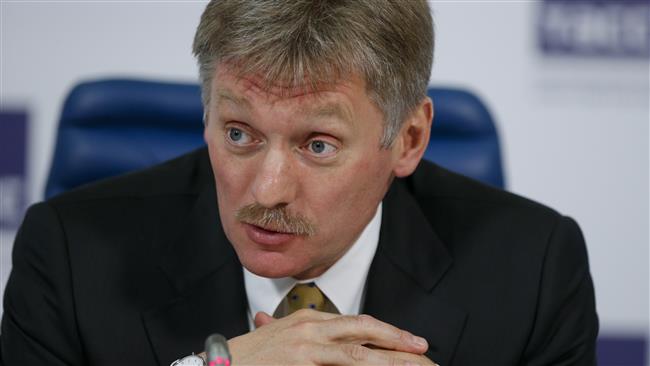Russia has vowed to keep up support for the Syrian military in its fight against terrorism, calling for the establishment of a fact-finding mission to probe a reported chemical attack in the Arab country’s northwestern Idlib Province.
“The Russian Federation and its military are continuing…to support the anti-terrorism operation and liberation of the country, which is being conducted by the Syrian armed forces,” Kremlin spokesman Dmitry Peskov told reporters on Wednesday.
He was responding to a question whether Russian policy had changed following the suspected chemical weapons attack, which left over 70 people dead in the town of Khan Sheikhoun in Idlib on Tuesday morning.
The militants operating in the area were quick to accuse Syrian government forces of striking the town using chemical munitions.
A number of Western states also sided with the militants and repeated the claims, which have not been backed up by any evidence.
Damascus, however, strongly denied using “any chemical or toxic material” in the town, adding that it “has not used nor will use in any place or time, neither in past or in future.”
The Russian Defense Ministry also said the Syrian air force recently hit a depot used by terrorists to make and store ammunition, including chemical weapons, at the site of the incident.
Syria has already turned over its entire chemical stockpile under a deal negotiated by Russia and the US, in a process overseen by the supervision of the Organization for the Prohibition of Chemical Weapons (OPCW).
Peskov further reiterated the Russian Defense Ministry’s report that the chemical contamination, if any, may have been caused by damage to a militant chemical weapons storage site.
Peskov’s remarks came after US Secretary of State Rex Tillerson said it was time for Russia to think carefully about its support for Assad.
‘Let’s not jump to the conclusion’
Meanwhile, the Russian Foreign Ministry spokeswoman Maria Zakharova said Wednesday that the Security Council should urge the OPCW to launch a fact-finding mission to look into the incident provided that full access to the incident site, which is controlled by militants, is allowed.
“It is crucial to call upon an OPCW fact-finding mission in charge of investigating the use of chemical weapons in Syria to collect evidence of the incident under the following condition – the composition of the fact-finding mission will be submitted to the UN Security Council for approval, and it will be balanced in terms of geographical representation,” Zakharova said.
On Wednesday, the UN Security Council held a meeting to discuss the reported chemical attack in Idlib, but the session hit an impasse amid deep divisions between Russia on the one side, and Britain, the US and France, on the other.
The trio delayed a vote on a draft resolution they had submitted to the council, which would condemn the attack and blame the Syrian government for the deaths, to allow time for negotiations with Russia. Moscow denounced the Western-proposed resolution as “unacceptable.”
Also commenting on the Idlib tragedy was Staffan de Mistura, UN special envoy for Syria, who said reliable evidence would be needed to confirm if any chemical weapons were actually used, let alone establish who was responsible for it.
“We have no yet any official or reliable confirmation,” he said on Wednesday. “We will be stimulating all those who have the capacity of finding out technically what had happened.”
In an interview with al-Mayadeen television channel on Tuesday, Syrian Deputy Foreign Minister Faisal al-Miqdad said Damascus, a few weeks ago, provided the OPCW with information on the transfer of toxic substances into Syria by the Takfiri Jabhat Fateh al-Sham terrorist group.
He emphasized that Syria stands against any use chemical weapons “by anyone, anywhere, and under any circumstances.”
Assad not a beneficiary
This is while political experts have questioned the logic behind the militant and Western accusations against the government of President Bashar al-Assad, whose forces have currently the upper hand against terror groups across the country.
They argue that the Syrian government has no rational reason to resort to such attacks amid ongoing peace efforts on the diplomatic scene, which has seen several rounds of negotiations between Damascus and opposition groups with the support of the UN as well as Russia, Iran and Turkey.
Speaking to Press TV on Wednesday, Marwa Osman, a journalist and political commentator, drew a parallel between the current anti-Damascus accusations to those made in 2013, when a deadly chemical attack took place in Syria’s East Ghouta.
“The Russian army said that they have evidence that this sarin gas that was used on civilians in Idlib was delivered from Iraq. Therefore ISIS (Daesh) has a hand in there because previously throughout 2012 up until now ISIS has attacked several civilian targets with sarin gas without the UN ever calling for an emergency meeting,” he said.
He further asked, “What kind of geopolitical benefit Idlib is for the peace talks to find a resolution for the war on Syria? What kind of a weight does Idlib have? It has no weight compared to what Aleppo for example had or what now Raqqah has.”
Michael Lane, founder of American Institute for Foreign Policy, also told Press TV that “We do not know exactly what happened yet. There is still an investigation to be done.”
Russia and Syria say the militants operating to topple the Damascus government have on several occasions launched gas attacks against civilians, including the ones in Ghouta and Aleppo, where Russian military experts took samples in late 2016.
LINK: https://www.ansarpress.com/english/5959
TAGS:































 online news tv
online news tv




